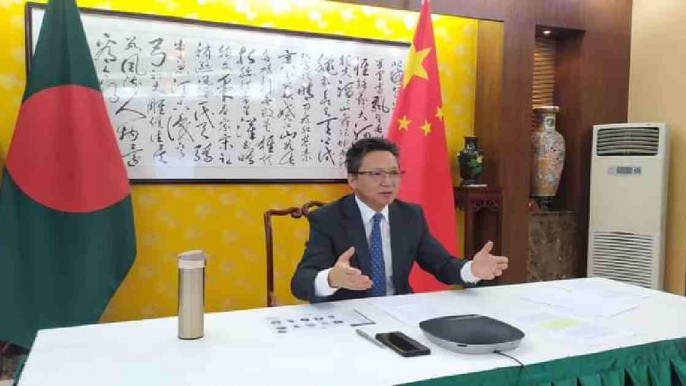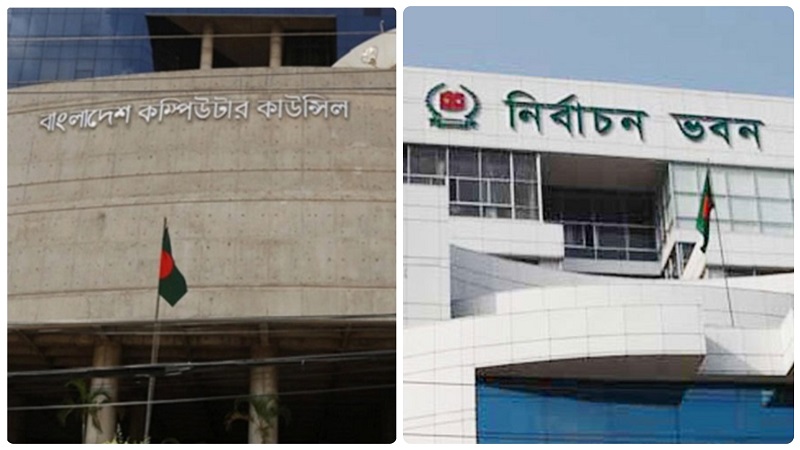Chinese Ambassador to Bangladesh Li Jiming has said Bangladesh should never worry about bad debt or so-called debt trap, noting that Bangladesh has managed foreign debt very well with an excellent system in place.
"I would say that you've managed foreign debt very, very well, and there's no such bad debt so far at all. You've earned a very, very high credit internationally in terms of [managing] international debts. So, never worry about that," Ambassador Li said.
The Chinese ambassador also said China will continue to serve as a "bridge of communication and try its best to facilitate early results" as Bangladesh seeks early repatriation of Rohingyas to Myanmar.
"We fully understand the keenness of Bangladesh to start repatriation, and our determination to help the two friendly neighbours resolve this long-standing issue will never change," he told an online symposium titled "Bangladesh-China Relations: Prognosis for the Future" hosted by the Cosmos Foundation on Thursday evening.
Cosmos Foundation Chairman Enayetullah Khan delivered the opening and concluding remarks at the event while Dr Iftekhar Ahmed Chowdhury, renowned scholar-diplomat and adviser on foreign affairs to the last caretaker government, chaired the session.
Ambassador (retd) Tariq A Karim, Centre for Policy Dialogue Distinguished Fellow Dr Debapriya Bhattacharya, former foreign secretary Shamsher M Chowdhury, Assistant Researcher of the Institute for International Studies at Yunnan University Dr Zou Yingmeng, Assistant Research Fellow at China Institute of International Studies Dr Ning Shengnan, former ambassador Serajul Islam and Dhaka University Professor Dr Rashed Al Mahmud Titumir comprised the panel of discussants.
The example of Sri Lanka came up in the context of a country that fell into a "debt trap" as a result of public investment projects financed by China.
Ambassador Li, who delivered the keynote address at the symposium, however, said there is no proven evidence that China created any "debt trap" in any country, including Sri Lanka and Bangladesh.
"I think you've an excellent system and you've excellent officials and ministers to take care of that. So, never worry about that," said the ambassador.
Referring to an article he read regarding Sri Lanka's debt situation, the Chinese envoy said the total Chinese debt accounts for less than 8% of the whole debt of that country and of this 8% Chinese debts, much less is related to the Belt and Road projects.
The ambassador also said there is government-to-government debt, which is normally a soft, concessional loan with a very low interest and for a very long period of time.
Dr Debapriya of the CPD said China has emerged as a big financial investor in Bangladesh involving major projects and those projects have major infrastructural implications.
Now there is a debated issue across the world whether this kind of financial flow is a "debt trap" for countries like Bangladesh as it happened in Sri Lanka, he said.
"Thankfully, Bangladesh's external debt remains moderately manageable and most of the country's debts are from the multinational agencies and at this moment it is not China," said the economist.
Dr Debapriya, however, said they should be really mindful about the debt repayment issue although they are in a comfortable position at this stage. Bangladesh's total outstanding debt burden is well under 40% of GDP.
"But there are projections that this debt issue would be a challenging point for the Bangladesh-China relationship beyond 2024," he added.
Ambassador Li said the two countries – Bangladesh and China – need to advance the Belt and Road Initiative (BRI), noting that there is no doubt that closer cooperation under the BRI will strengthen strategic partnership of cooperation.
Bangladesh is the first South Asian country to sign up for the BRI, which was first proposed by President Xi Jinping in 2013.
Ambassador Li said last year, braving the huge threat of Covid-19, many Chinese managers, engineers, technicians and workers in Bangladesh chose not to leave for home, thus ensuring the steady progress of major BRI projects in Bangladesh.
Statistics show that the accumulated infrastructure construction contract volume between China and Bangladesh has reached $72.6 billion by the end of 2020, said Ambassador Li.
The Chinese ambassador emphasised that China had never taken India as a "strategic rival" rather they considered India a good neighbour of China.
He, as the Chinese ambassador to India's neighboring country – Bangladesh, hoped that this China-India relationship would be improved more in the future.













